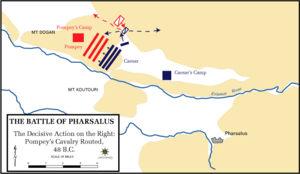Battle of Pharsalus facts for kids
Quick facts for kids Battle of Pharsalus |
|||||||
|---|---|---|---|---|---|---|---|
| Part of Caesar's Civil War | |||||||
 |
|||||||
|
|||||||
| Belligerents | |||||||
| Populares | Optimates | ||||||
| Commanders and leaders | |||||||
| Gaius Julius Caesar Mark Antony |
Gnaeus Pompeius Magnus | ||||||
| Strength | |||||||
| Approximately 22,000 legionaries, 5,000-10,000 Auxiliaries and Allies, and Allied Cavalry of 1800 | Approximately 40,000-60,000 legionaries, 4,200 Auxiliaries and Allies, and Allied Cavalry of 5,000-8,000 |
||||||
| Casualties and losses | |||||||
| 1,200 | 6,000 | ||||||
The Battle of Pharsalus was a very important battle during Caesar's Civil War. It happened on August 9, 48 BC, in a place called Pharsalus in central Greece. In this battle, Gaius Julius Caesar and his supporters fought against the army of the Roman Republic. This army was led by Gnaeus Pompeius Magnus, also known as "Pompey the Great." Pompey had the support of most of the senators. His army was much bigger than Caesar's experienced soldiers.
Getting Ready for Battle
Pompey had a larger army, but he knew Caesar's troops were very skilled. They had a lot of battle experience. So, Pompey decided not to fight a big battle right away. Instead, he tried to cut off Caesar's supplies. He hoped to starve Caesar's army.
Caesar tried to attack Pompey's camp, but it almost went very wrong. He had to pull his troops back to get them ready again. Pompey did not follow up on this success immediately. The winter of 49–48 BC was spent with both sides trying to block each other. They also tried to lay siege to each other's positions.
Finally, Pompey pushed Caesar into a region called Thessaly. Pompey's allies in the Senate really wanted him to fight Caesar. They pushed him to confront Caesar near Pharsalus. Pompey's allies disagreed with him about fighting there. Pompey wanted to keep starving Caesar's soldiers. But his allies forced him to fight the battle.
The Battle Begins
Caesar wrote that there was a lot of space between the two armies. Pompey told his soldiers not to charge forward. He wanted them to wait until Caesar's legions came very close. His plan was to make Caesar's men tired before the fighting even started.
Caesar's men saw that Pompey's army was not moving. So, without being told, they stopped to rest and get ready again. Then they continued their charge. Caesar later wrote about how disciplined and experienced his soldiers were. He also wondered why Pompey chose not to charge first.
When the armies met, Labienus, who led Pompey's cavalry, ordered his horsemen to attack. At first, they did well. But then Caesar told his own cavalry to pull back. Caesar's light troops then attacked Pompey's cavalry very fiercely. The first group of Pompey's horsemen got scared by the javelins thrown by Caesar's soldiers. This caused all of Pompey's cavalry to become disorganized.
When Pompey's cavalry ran away, Caesar's men killed the light troops who were supporting them. Then, Caesar's soldiers attacked Pompey's left side. They joined up with their own cavalry again. This allowed them to get behind Pompey's army and attack from the rear. Caesar then sent in his third line of soldiers, who had not fought yet. This put even more pressure on Pompey's army. The remaining soldiers of Pompey's army ran away. Soon, the main battle was over.
Pompey went back to his camp and told the soldiers there to defend it. Caesar urged his men to capture the enemy camp. They attacked the camp walls very strongly. The Thracians and other helper troops left in the camp fought bravely. But they could not stop Caesar's attack. Pompey fled with a small group of men. He claimed that he had been betrayed. Caesar had won his biggest victory. He had lost only about 200 soldiers and 30 officers.
What Happened Next
Pompey ran away from Pharsalus to Egypt. There, he was killed by people working for Pharaoh Ptolemy XIII. Ptolemy XIII sent Pompey's head to Caesar. He hoped this would make Caesar happy. But Caesar was not pleased with this gift. Pompey had been married to Caesar's only daughter, who had passed away. Also, Ptolemy did not realize that Caesar was forgiving many of the senators and their men. These were men who had once been Caesar's enemies.
The Battle of Pharsalus ended the wars of the First Triumvirate. This was a group of three powerful Roman leaders. However, the Roman Civil War was not completely over. Pompey's two sons and his supporters, now led by Labienus, continued to fight. They fought in the name of Pompey the Great. Caesar spent the next few years dealing with the remaining groups who opposed him. After he finally finished this task, he was killed in a plan made by Brutus and Cassius.
Images for kids
See also
 In Spanish: Batalla de Farsalia para niños
In Spanish: Batalla de Farsalia para niños
 | Charles R. Drew |
 | Benjamin Banneker |
 | Jane C. Wright |
 | Roger Arliner Young |



